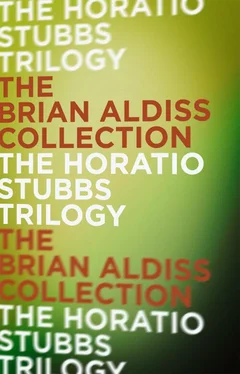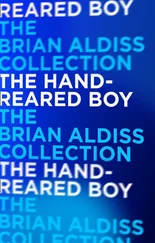Brian Aldiss - The Horatio Stubbs Trilogy
Здесь есть возможность читать онлайн «Brian Aldiss - The Horatio Stubbs Trilogy» — ознакомительный отрывок электронной книги совершенно бесплатно, а после прочтения отрывка купить полную версию. В некоторых случаях можно слушать аудио, скачать через торрент в формате fb2 и присутствует краткое содержание. Жанр: unrecognised, на английском языке. Описание произведения, (предисловие) а так же отзывы посетителей доступны на портале библиотеки ЛибКат.
- Название:The Horatio Stubbs Trilogy
- Автор:
- Жанр:
- Год:неизвестен
- ISBN:нет данных
- Рейтинг книги:4 / 5. Голосов: 1
-
Избранное:Добавить в избранное
- Отзывы:
-
Ваша оценка:
- 80
- 1
- 2
- 3
- 4
- 5
The Horatio Stubbs Trilogy: краткое содержание, описание и аннотация
Предлагаем к чтению аннотацию, описание, краткое содержание или предисловие (зависит от того, что написал сам автор книги «The Horatio Stubbs Trilogy»). Если вы не нашли необходимую информацию о книге — напишите в комментариях, мы постараемся отыскать её.
The Horatio Stubbs Trilogy — читать онлайн ознакомительный отрывок
Ниже представлен текст книги, разбитый по страницам. Система сохранения места последней прочитанной страницы, позволяет с удобством читать онлайн бесплатно книгу «The Horatio Stubbs Trilogy», без необходимости каждый раз заново искать на чём Вы остановились. Поставьте закладку, и сможете в любой момент перейти на страницу, на которой закончили чтение.
Интервал:
Закладка:
‘I must go, Horry, I must go. You know I couldn’t live with you if you are a friend of Spaldine’s – I have evidence to prove he is in my cousin’s pay.’
In her agitation she pushed from me and hurried from the shop. She was buttoning up her gloves as she went, and it was frightfully important they should be buttoned. I stood there for a moment reeling. I knew it was hopeless. Then I had to follow or she would be gone for ever.
I passed the grinning assistants. ‘Fuck off!’ I said.
Virginia was walking slowly along the Strand. Unable to think what to say to her, I stayed a pace or two behind her. She turned left, down one of the side streets that lead to the Embankment. Perhaps she was going to throw herself in the Thames?
She started when I humbly touched her arm.
‘Forgive me for upsetting you by anything I said, dearest Virginia! I hate Spaldine’s guts – I told you, he attacked me, so he hates mine. Nor do I know any other single person in the world who knows you. Your past life is no business of mine, Virginia. I love you. Don’t turn me away!’
‘You’re very sweet,’ was all she said. We walked side by side silently. We stood looking at the Thames.
The intuitive core in me told me that she was seeking for ways to cast me off finally. I made an error then that I was to make again a few years later, more fatally. I begged her to marry me.
She stood there against me, her head down, as I grasped her arms through her thin coat – a ridiculous position, I suppose.
Finally, she looked up at me, with her face full of sweetness and gentleness. She said, ‘What an amazing history we have had, Horry! You are a wonderful person and we have been like two children together, haven’t we? But I have deeply misled you. Please don’t be hurt. I’ve always warned you that life is much more complicated than you think. My own life is too involved for anyone else to contemplate. I already owe several thousand pounds to people – you could not shoulder such debts.’
‘Are you telling me the truth?’
‘It’s all too true, I’m afraid. But I can’t marry you for a different reason. I am already married. My husband was a terrible gambler, and I am saddled with his debts …’
‘You’re married …’ It was as if I was drowning. No air reached my lungs.
‘It was wrong of me not to tell you, darling, when you have been so sweet. Everyone who gets mixed up with me comes to grief.’
She lifted my hand and kissed it, glanced almost furtively at me, and then hurried off, walking with her quick light gait up the street we had come. I stood staring, my feelings curdling within me. She glanced back once before she disappeared. I started to cry, burying my eyes in my knuckles.
Was she married? Only a month before, I would have believed her had she told me she was a German spy. Now I did not know what to believe. If she said what she said just to shake me off, then her gambit was a success. I was beaten. There was nothing I could do for her; whichever way I turned, she would see my move as a hostile one, part of the plot against her. There was no room for truth in her world of lies.
How would you judge Virginia Traven? For years I made no attempt to pass judgement. She hurt me, but hurt seems intrinsic in human relationships, and the hurt was not her intention – in almost any situation, she was the injured party. As for her lies, they enriched and widened my narrow little world.
There remains the sexual aspect of the matter. How much harm did she do to the boys she seduced, to the boys with whom she so genteelly and discreetly lay? Speaking for myself, I was delighted to be seduced, I thirsted for it, I went to great pains to be seduced. The same would undoubtedly be true of the odious Spaldine and Angel-Face Knowles. Virginia was no harpy, devouring all who came along her path. She only took in those who sought her out, and there was nothing perverted in her actual love-making.
True, Spaldine was unbalanced by the affair; but I found some evidence, thinking back, that he was unbalanced long before Sister arrived at the school. He had run away from school once – one of only three boys who ever did so; that might seem like a sane act against the insanity of Branwells, but nobody who listened alertly to Spaldine would have regarded him as an apostle of reason.
And there was Knowles. Did he develop a mother-fixation through his thrilling association with Virginia? He became quite well known in later life as a mountaineer, and I read with curious insight in an illustrated magazine article that his wife was ‘several years older’ than he. Was that an attempt to relive the Virginia experience? I believe it much more likely that he was that way inclined long before, or why would he have been drawn to Virginia in the first place?
Virginia had powerful advantages over all the other girls I knew in those days, first among which was her experience. She was past the age of being embarrassed or of thinking of sex as a dirty joke. I was still at that age; so were my girl friends, like Esmeralda. Loving for Virginia, and consequently for her favoured boys, was a comforting and soothing thing. In her modest way she was expert; and expertise is really the butter on the bread of sex.
It is curious at last to write on the subject of Virginia. She passed out of my life twenty-eight years ago. Yet she has never been entirely absent from my life, even when I have not thought of her for months, perhaps years. Now I am on the subject, I can hardly bear to come off it.
I loved Virginia well. I did not love her for sex alone. Before I found out about all the lies, I believed her to be good, almost saintly. I can still see how and why I thought her so wonderful, although irrelevant things like snobbery clouded my judgement – for she must always have been no more prosperous than my family, and so the simple way she came into humble cafés with me was not the elegant piece of broad-mindedness I imagined it at the time, but the indifference of custom.
So I come back to my first intuitions about her – that she had been deeply hurt. Something in her childhood had disrupted the entire course of her life … such a judgement is a cliché now, so much so that it is often patronizingly dismissed by the sophisticated. But the elementary perception that childhood injustices warp lives has done little to affect the general consensus of opinion, which acts on an older and more primitive principle, that an eye merits an eye, that sin deserves punishment. In many cases it is the punishment which fathers the sin.
But I refuse to think of Virginia in these text-book terms. Something had severely hurt her in childhood – no doubt her nature was also prone to receive the hurt. As an adult, she would be classified now as paranoic, I suppose.
In my youthful eyes she was none of these things; she was only herself, a woman in whose arms I had first tasted beauty and release, and through them discovered my better self.
She left me standing by the Thames. It seemed to me that I would never be able to recover myself, that I had lost too much. After a little while it occurred to me to run after her, to seize her, to force her to believe me and tell the truth. But by then it was too late.
For the rest of the day I wandered through the city. The painful deflections of life that all the towns of Europe were suffering found their echo in England’s capital. Barricades of sandbags were going up; the fountains were turned off in Trafalgar Square. A platoon of soldiers was marching towards Westminster; I stopped to watch them go by, looked at the set faces of the men, lacking individuality. Already children were being evacuated to the country. Their place was being taken by men in uniform.
Idly, I looked about to see if by any chance I could see Nelson. But it was my father I wanted. Perhaps he would come down to London and persuade me to go back home with him …
Читать дальшеИнтервал:
Закладка:
Похожие книги на «The Horatio Stubbs Trilogy»
Представляем Вашему вниманию похожие книги на «The Horatio Stubbs Trilogy» списком для выбора. Мы отобрали схожую по названию и смыслу литературу в надежде предоставить читателям больше вариантов отыскать новые, интересные, ещё непрочитанные произведения.
Обсуждение, отзывы о книге «The Horatio Stubbs Trilogy» и просто собственные мнения читателей. Оставьте ваши комментарии, напишите, что Вы думаете о произведении, его смысле или главных героях. Укажите что конкретно понравилось, а что нет, и почему Вы так считаете.












